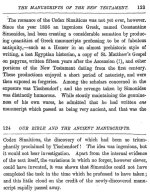He has mentioned a few. His fall back is John Burgon. I'm sure you can do your own research and decide whether he is qualified or not. (He's not.) By what measure? Nestle, Aland, Metzger, Wallace ... et. al.
Be my guest, You can waste your time scrolling back through his posts to see the rest of his "authorities." I'm not about to.
First, I don't. I have no need to, except when
I'M presenting a position that is dependent upon the Greek text. Then I type the Greek text followed by the gloss, along with links to the Liddell Scott Lexicon (because such links are available). I prefer the Cambridge Greek Lexicon, or Kittles, but these resources are not on line, so I type the text in when necessary. Again, if necessary, I explain some of the more interesting grammatical issues of the language. I know the difference between a tense and an aspect, I know the difference between the subject and the object, I can parse a modifying clause and know that gender matching is crucial to clarity.
@marke has made his claims touting the superiority of the KJV. Technically, the ball is in his court to prove those claims. He has not. He has merely posted invective and slur, not academic reasons. As I have mentioned elsewhere, the translators of this Catholic Bible (the KJV) had no idea about the Koine Dialect of the New Testament texts, so they made some mistakes, and some purposeful mistranslations to protect cherished doctrines.
“One man is to be given the credit for the discovery of the Koine – a German pastor named Adolf Deissmann. Even though one or two perceptive scholars had noted the true character of NT Greek as early as the middle of the nineteenth century, their statements made no impression on general opinion. Deissmann, on a visit to a friend in Marburg, found a volume of Greek papyri from Egypt, and leafing through this publication, he was struck by the similarity to the Greek of the NT. He followed up this observation with continued study, and his publications of his findings finally led to general acceptance of the position that the peculiarities of the Greek NT were, for the most part, to be explained by reference to the nonliterary Greek, the popular colloquial language of the period. He first published his results in two volumes of Bible Studies (1895, 1897) and later on in the justly popular Life from the Ancient East (1908).”
- The Interpreter’s Dictionary of the Bible, pg. 486.
But the KVJ was not written for the common man to read in order to make up his own mind about what the Bible says, it was published to be used as a reference tool for the Bishops and Vicars of the Anglican Church, such that they appease the Puritan threat.
What's touted as the TR was basically an appendix to the work of Erasmus whose purpose was to promote his
Latin Bible as superior to, and a replacement for, the Vulgate. That
@marke has chosen to ignore these fact, so be it.
Well that's a nasty little piece of invective right there, so I'll forgive you by ignoring it for the pathetic straw man that it is.
No thanks. I doubt it's worth it.
WOW... you're an EXPERT to speak for the whole of the internet?? (I am so humbled). But really, you worry about whether you impress people on the internet? That's so sad.
Well that statement is so mewling I don't even know where to start. It's a lame comeback typically from people who actually don't know Greek, or realize they are way out of their wheelhouse. But by what measure can you conclude that I "pretend"? Or do you just have your knickers in a twist? Maybe jealousy? Seriously, what is wrong with you? In that I've never read any of your posts, I don't know. And honestly, I couldn't care less. You want make it about the person, and I've made it about the scholarship. And so if you can't read Greek, put on your big boy pants and go learn something. (Or maybe you'd like to post your CV.)
Can you at least rise a little bit above the level of childish?
How about you go first, and parse this phrase for me....
και την περικεφαλαιαν του σωτηριου δεξασθε και την μαχαιραν του πνευματος ο εστιν ρημα θεου δια πασης προσευχης
And then I'll tell you why you're wrong.
Rhema


